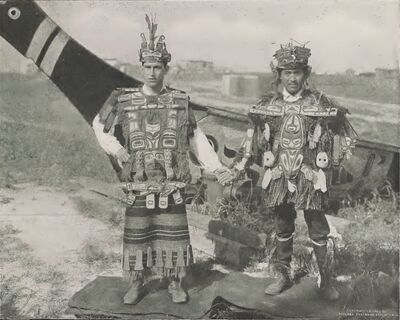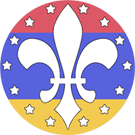Klaokwaht: Difference between revisions
(Created page with "{{SHORTDESC:Klaokwaht}} {{Infobox FairBuilding | name = Klaokwaht | image = Klaokwaht.jpg | image_alt = | image_size = 400px | caption = Klaokwaht | alternate_name = | location = Anthropology Area | no_buildings = 1 | construction_cost= | furnishing_cost = | profit = | owner = | architect = | dimensions = | adult_entry = | child_entry = | opening_day...") |
No edit summary |
||
| (2 intermediate revisions by the same user not shown) | |||
| Line 10: | Line 10: | ||
| no_buildings = 1 | | no_buildings = 1 | ||
| construction_cost= | | construction_cost= | ||
| furnishing_cost = | | furnishing_cost = | ||
| profit = | | profit = | ||
| owner = | | owner = | ||
| Line 22: | Line 22: | ||
| other = | | other = | ||
}} | }} | ||
The Klaokwaht group and typical habitation were brought from Vancouver Island to the Exposition. | |||
==Before the Fair== | ==Before the Fair== | ||
Dr. George A. Dorsey of the Field Columbian Museum, and Dr. C.F. Newcombe of Victoria, B. C., were responsible for bringing the members to the Fair. | |||
==Description== | ==Description== | ||
The Klaokwakt clan-house was built of heavy puncheons and squared logs and decorated with carved and painted totemic devices. | |||
Two members of the neighboring Kwakiutl tribe, known for elaborate totemic or heraldic crests carved on great wooden columns and house-fronts, were also brought, along with examples of their craft. | |||
===Kwakiutl=== | |||
The two members of the Kwakiutl tribe were Klalish (James Nowell), and Klakoglas (Bob Harris) | |||
The combined group occupied the Klaokwaht house while their great sea-canoe (carved from a single tree-trunk and capable of carrying a crew of forty) lay alongside. | |||
Klalish and Klakoglas wore the ceremonial coats and headdresses of their people. The head dress of Klalish represents in the folk lore of | |||
the tribe “Thunder Bird” which by the flapping of its wings produces thunder and which is of such enormous size that it feeds on whales. The head dress of Klakoglas represents “Killer Whale,” an animal larger than the whale. | |||
==After the Fair== | ==After the Fair== | ||
Latest revision as of 00:20, 28 November 2022
 | |
| Location | Anthropology Area |
|---|---|
| No. of Buildings | 1 |
The Klaokwaht group and typical habitation were brought from Vancouver Island to the Exposition.
Before the Fair[edit | edit source]
Dr. George A. Dorsey of the Field Columbian Museum, and Dr. C.F. Newcombe of Victoria, B. C., were responsible for bringing the members to the Fair.
Description[edit | edit source]
The Klaokwakt clan-house was built of heavy puncheons and squared logs and decorated with carved and painted totemic devices. Two members of the neighboring Kwakiutl tribe, known for elaborate totemic or heraldic crests carved on great wooden columns and house-fronts, were also brought, along with examples of their craft.
Kwakiutl[edit | edit source]
The two members of the Kwakiutl tribe were Klalish (James Nowell), and Klakoglas (Bob Harris) The combined group occupied the Klaokwaht house while their great sea-canoe (carved from a single tree-trunk and capable of carrying a crew of forty) lay alongside. Klalish and Klakoglas wore the ceremonial coats and headdresses of their people. The head dress of Klalish represents in the folk lore of the tribe “Thunder Bird” which by the flapping of its wings produces thunder and which is of such enormous size that it feeds on whales. The head dress of Klakoglas represents “Killer Whale,” an animal larger than the whale.
